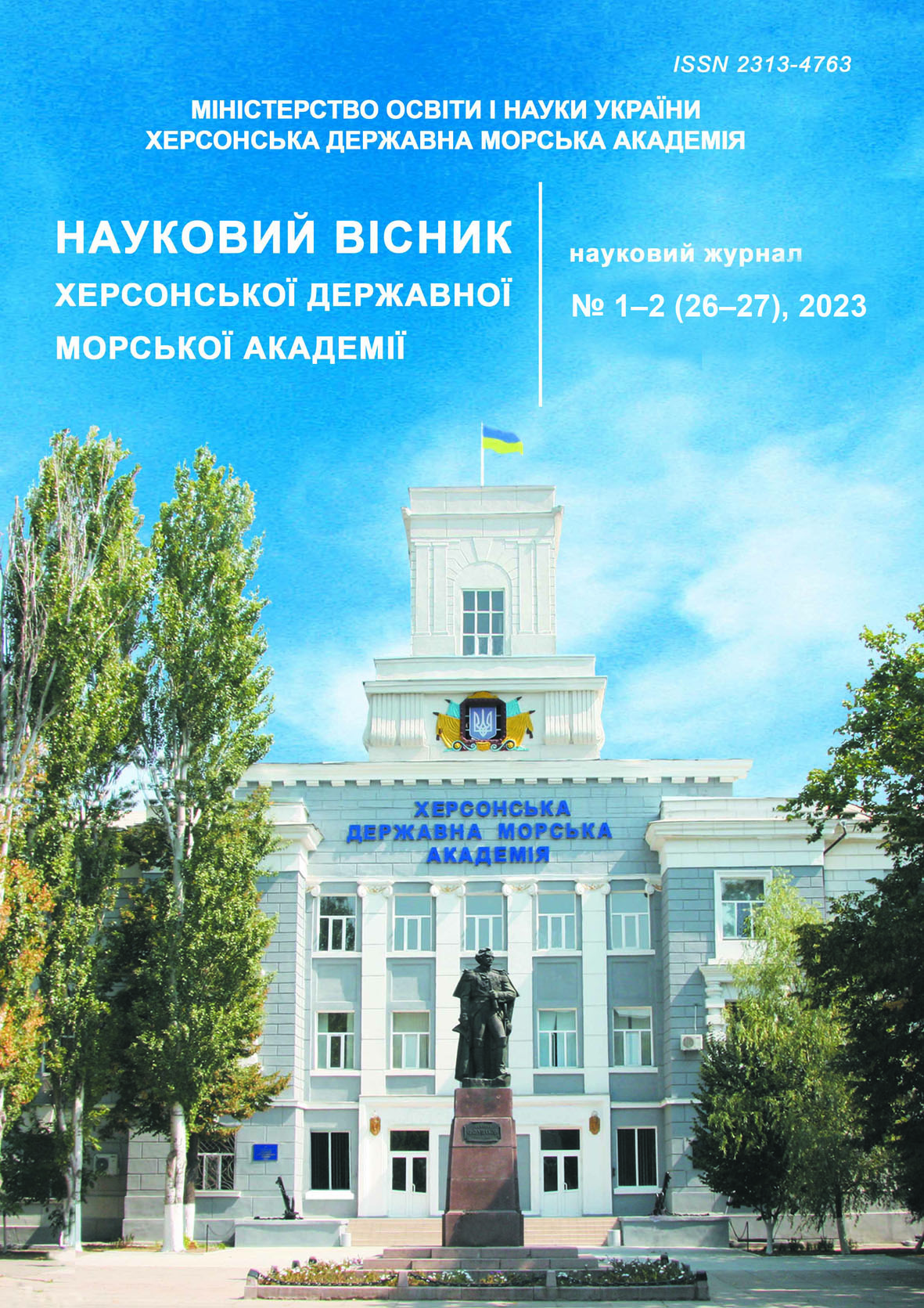ANALYSIS OF THE CURRENT STATUS OF THE METHODS OF CONTAINER CARGO PLANS FORMATION AND WAYS OF THEIR FURTHER IMPROVEMENT
https://doi.org/10.33815/2313-4763.2023.1-2.26-27.006-016
Abstract
The article is devoted to optimization of container carriers’ cargo plans in the conditions of multiport container transportation. A comparative analysis of the existing methods of formation and optimization of container carriers’ cargo plans was carried out, and the advantages and disadvantages of the practical application of each method were determined. The potential problems that arise during the practical application of the considered analytical and heuristic methods are emphasized. A number of mandatory conditions that must be met when drawing up the cargo plan of container carriers and the ways of their application as restrictions when solving a multi-criteria optimization problem are defined. The peculiarities of the process of building container carriers’ cargo plans during multiport container transportation are analyzed and the choice of the best method for solving the task of optimizing the structure of the ship’s cargo plan under the specified conditions is substantiated. The perspective of using multi-stage adaptive methods for optimizing cargo plans of container carriers is shown.
An adaptive multi-stage method of forming the optimal cargo plan of the vessel has been developed and the functions of the decision-making support system of the shipmaster for its practical implementation have been determined. The criteria for evaluating the quality of optimization of the ship's cargo plan are proposed. Prospective ways of further development and improvement of methods of forming plans of container carriers in modern conditions are considered.
References
2. Dubrovsky, O., Levitin, G., Penn, M. (2002). A genetic algorithm with a compact solution encoding for the containership stowage problem. Journal of Heuristics. Vol. 8. No. 6. Р. 585–599.
3. Fan, L., Low, M. Y. H., Hsu, W. J., Huang, Sh. Y., Zeng, M., Win, Ch. A. (2011). Randomized algorithm with tabu search for multi-objective optimization of large containership stowage plans. International Conference on Computational Logistics. Springer, Berlin, Heidelberg. Р. 256–272.
4. Hernández Hernández, P., Cruz-Reyes, L., Melin, P., Mar-Ortiz, J., Joaquín Fraire Huacuja, H., José Puga Soberanes, H, Javier González Barbosa, J. (2013). An Ant Colony Algorithm for Improving Ship Stability in the Containership Stowage Problem. MICAI 2013: Mexican International Conference on Artificial Intelligence. Р. 93–104.
5. Yurtseven, M. A., Boulougouris, E., Turan, O. (2018). Container ship stowage plan using steepest ascent hill climbing, genetic, and simulated annealing algorithms. Marine Design XIII. vol. 1. Р. 617–623.
6. Rahsed, D. M., Gheith, M. S., Eltawil, A. B. (2018). A Rule-based Greedy Algorithm to Solve Stowage Planning Problem. IEEE International Conference on Industrial Engineering and Engineering Management, December. P. 437–441.
7. Matsaini, Santosa В. (2018). Solving the container stowage problem (CSP) using particle swarm optimization (PSO). IOP Conference Series: Materials Science and Engineering. vol. 337, article no. 012002.
8. Kim, K. H., Kang, J. S., Ryu, K. R. (2004). A beam search algorithm for the load sequencing of outbound containers in port container terminals[J]. OR Spectrum. vol. 26. no. 1. Р. 93–116.
9. Kamieniev, K. I., Kamienieva, A. V. (2018). Vykopyctannia adytyvnoho alhopytmu dlia pozmishchennia nebezpechnykh vantazhiv na konteinernomu cudni. Cudovozhdenye. № 28. S. 70–77.
10. Li, F., Tian, C., Cao, R., Ding, W. (2008). An Integer Linear Programming for Container Stowage Problem. In: Bubak M., van Albada G. D., Dongarra J., Sloot P. M. A. (eds) Computational Science – ICCS 2008. ICCS 2008. Lecture Notes in Computer Science. vol. 5101. Springer, Berlin, Heidelberg. Р. 853–862.
11. Nakul, Yu. O. (2018). Matematychna model ostiinosti sudna pry rozpodili vahy konteineriv. Naukovi pratsi ChNU im. Petra Mohyly. Seriia: “Kompiuterni tekhnolohii”. Vyp. 305. T. 317. S. 18–22.
12. Yaagoubi, A. E., Alaoui, E. H., Boukachour, J. (2018). Multiobjective river-sea-going container barge stowage planning problem with container fragility and barge stability factors. GOL 2018 : The 4th International Conference on Logistics Operations Management. 1012 Apr. 2018. Le Havre, France. IEEE : Р. 214230.
13. Azevedo, A. T., Neto, L. L. S., Chaves, A. A., Moretti, A. C. (2018). Solving the 3D stowage planning problem integrated with the quay crane scheduling problem by representation by rules and genetic algorithm. Applied So Computing Journal. vol. 65. Р. 495–516.
14. Tsymbal, M. M. (2020). Formuvannia planu zavantazhennia konteinerovozu. Naukovyi visnyk Khersonskoi derzhavnoi morskoi akademii. №1(22). S. 64–73.
15. Ben, A. P., Fedorov, A. I. (2019). Formuvannia vantazhnoho planu konteinerovozu pry zdiisneni multyportovykh perevezen. Sudnovodinnia. №29. S. 10–19.
16. Fedorov, A. I. (2019). Metod formuvannia suboptymalnoho vantazhnoho planu konteinerovozu. Problemy informatsiinykh tekhnolohii. №25. S. 96–100.
17. Tsymbal, M. N. (2019). Formirovaniye tenzora zagruzki konteynerovoza v sluchaye provedeniya gruzovykh operatsiy v neskol'kikh portakh. Sudnovodіnnya. Vip. 29. S. 35–41.






